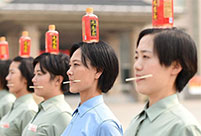

TOKYO, Sept. 24-- Japanese Prime Minister Shinzo Abe on Thursday pledged to prioritize the economy and increase gross domestic product to 600 trillion yen (about 5 trillion U.S. dollars) as part of his second tier of economy-based policies, but public sentiment remains soured following his unpopular move to expand the overseas role of the military and Abenomics 2.0 may not be enough to reinstall the public's faith.
At a press conference held at the ruling Liberal Democratic Party's (LDP) headquarters, following the prime minister's uncontested reappointment as the party's president, Abe said he would now switch his attention back to the economy and the second stage of his "Abenomics" blend of aggressive monetary easing, stimulus measures and structural reform policies, stating that he "would like to move toward new nation-building efforts with an eye to the future," and was now "moving to the second stage of ' Abenomics'," and adding that he would ensure his new policies, including three new pillars of expansion, child-rearing and social security support, would be taken to the "next level."
And with Japan's rapidly aging societies, one of the most significant issues weighing on the future of the nation's economy, as social security and medical costs increase as the size of the nation's workforce decreases commensurate with Japan's declining birthrate, Abe also vowed to create a society that can care for the elderly and keep people in jobs, as according to the latest government statistics, 100,000 people quit their jobs each year to care for elderly relatives, a facet of society the prime minister wants to address as people leaving work combined with a shrinking population threatens to accelerate the hollowing out of Japan's labor force.
Abe said he is planning legislation to facilitate people taking time out to care for elderly relatives, rather than quitting their jobs altogether, as well as making better provisions for maternity and paternity leave from work.
In addition, for the state budget for the next fiscal year, the government will include spending to increase the number of intermediary nursing homes for elderly people waiting to move into full-time nursing facilities.
But Abe's latest pledges have been met by mixed reactions from public and analysts who are now wary of the prime minister's motives, following him being elected to office on a pledge of economic reform, but then switching his agenda to a military one, that saw him forcibly ram legislation through parliament that was enacted recently to expand the role of Japan's military and effectively reverse 70 years of pacifism in Japan.
"We've all heard the 'Abenomics' mantra before and we believed it, but following the tax hike last April the country has been struggling economically and in the last fiscal half the economy contracted," Yasuyuki Nagano, a portfolio manager, told Xinhua.
"I can't help wondering whether the prime minister was so busy with his military agenda, that the economy has taken a back seat, or whether 'Abenomics' was just a way to gain the public's trust so he could exert his influence over the defense legislation in parliament," Nagano said.
And with 25,000 people gathering in a park next to NHK in central Tokyo on Wednesday to continue their protests against the government's enactment of the controversial security legislation, that will allow for Japanese troops to come to the aid of an ally like the United States, even if Japan itself is not under attack, and operate as a normalized military force without geographical restrains, political watchers said the mood of the nation remains soured and trust in Abe and his administration has been diminished.
"The public are not as open or as enthusiastic about 'Abenomics 2.0' as they were after the prime minister returned to office in 2012, because there has been no major improvements in the economy since then, and the prime minister's only real achievement has been a universally condemned move to put the nation back on a war path," Asian affairs commentator Kaoru Imori told Xinhua.
"It will be interesting to see at the beginning of next month when the prime minister reshuffles his Cabinet, whether it will be based on future economic or future defense policies. I think that if economic improvements are not seen soon and reflected at a household level, trust in the government will further erode," Imori said.
To this end, according to the latest media polls, public support for the prime minister has slumped to its lowest level since Abe came to office following the passage of the controversial war bills, with the Nikkei business daily reporting the support rate as dropping 6 percentage points from last month to 40 percent, with the disapproval rate climbing seven points to 47 percent.
The poll showed that citizens were concerned the new legislation could drag Japan into U.S.-led conflicts and as such the Nikkei's survey also revealed that 54 percent of the public disapproved of the bills and believed they had not been sufficiently explained, compared to just 31 percent who supported the changes.
Along with other popular dailies, including the Asahi, Mainichi and Yomiuri newspapers who all reported similar drops in support rates recently, a Kyodo News poll showed that the approval rating for Abe's Cabinet has fallen to a record low of 38.9 percent, compared to 43.2 percent in a poll taken last month.
According to the poll, just over 14 percent of those surveyed said that the Diet had sufficiently deliberated the security bills prior to their enactment, compared to 79 percent who felt debate had been insufficient. Sixty-eight percent of those polled also said they believe the new legislation will increase Japan's risk of becoming embroiled in war.
In addition, Kyodo's poll revealed that more than 69 percent of the public were opposed to Abe being re-elected as LDP President in an uncontested race, with support for the ruling LDP dropping 2. 2 percent to 32.8 percent.
"The statistics speak for themselves and what we are seeing is that the public is outraged at Abe and his administration not upholding the nation's Constitution that has kept the country safe and acted as a global beacon of pacifism since the end of WWII 70 years ago," Imori continued.
"I don't think the public can be fooled twice. Economic revival is a given - it's the very lowest expectation the public have of the government. What they now really crave is honesty, transparency and a guarantee of this country's safety, which at the moment is lacking on all fronts," Imori concluded.
Cabinet has fallen to a record low of 38.9 percent, compared to 43.2 percent in a poll taken last month.
According to the poll, just over 14 percent of those surveyed said that the Diet had sufficiently deliberated the security bills prior to their enactment, compared to 79 percent who felt debate had been insufficient. Sixty-eight percent of those polled also said they believe the new legislation will increase Japan's risk of becoming embroiled in war.
In addition, Kyodo's poll revealed that more than 69 percent of the public were opposed to Abe being re-elected as LDP President in an uncontested race, with support for the ruling LDP dropping 2. 2 percent to 32.8 percent.
"The statistics speak for themselves and what we are seeing is that the public is outraged at Abe and his administration not upholding the nation's Constitution that has kept the country safe and acted as a global beacon of pacifism since the end of WWII 70 years ago," Imori continued.
"I don't think the public can be fooled twice. Economic revival is a given - it's the very lowest expectation the public have of the government. What they now really crave is honesty, transparency and a guarantee of this country's safety, which at the moment is lacking on all fronts," Imori concluded.
 Construction of HK-Zhuhai-Macao Bridge enters final stage
Construction of HK-Zhuhai-Macao Bridge enters final stage Model of heavy-lift copter makes debuts at Tianjin expo
Model of heavy-lift copter makes debuts at Tianjin expo Art photos of Chinese beauty in Han Chinese clothing
Art photos of Chinese beauty in Han Chinese clothing Stunning photos of air show in China’s V-Day parade
Stunning photos of air show in China’s V-Day parade Models change clothes on street in Hangzhou
Models change clothes on street in Hangzhou Charming Chinese female soldiers
Charming Chinese female soldiers Beauty vs. muscular man
Beauty vs. muscular man World's passenger plane giants convene in Beijing aviation expo
World's passenger plane giants convene in Beijing aviation expo First day in kindergarten
First day in kindergarten Cheating Canada
Cheating Canada Fall of the front
Fall of the front NDRC defends credibility of GDP data
NDRC defends credibility of GDP data Xi-Obama meet can set template for future
Xi-Obama meet can set template for futureDay|Week